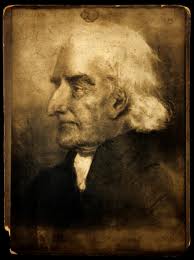William Tuke
| William Tuke | |
|---|---|
 | |
| Born | 24 March 1732 York, United Kingdom |
| Died | 1822 York, United Kingdom |
| Nationality | British |
| Occupation | Tea Merchant, Philanthropist |
| Known for | Founder of the York Retreat, |
William Tuke was an English businessman, philanthropist and Quaker. He was instrumental in the development of more humane methods in the custody and care of people with mental disorders, an approach that came to be known as moral treatment.
Tuke was born in York to a leading Quaker family. His ancstors were connected to the English aristocracy, and once served at the court of King Henry VIII. Tuke himself went into the family tea and coffee merchant business that had been started by his grandmothe, Mary Tuke, in 1725, and she passed it on to him in 1755. In later years it became part of Twinings tea company following the second world war. In 1754 he married Elizabeth Hoyland, and in 1765 he married Esther Maud whose "talents for leadership, ministerial work and educational advancement became a vital source of influence upon William's son Henry".
Following the death of Hannah Mills in appalling conditions in York Asylum in 1790, Tuke was asked to take the lead in Quaker efforts to develop a more humane alternative. Tuke, together with Godfrey Higgins set about investigating the appalling conditions within the York Lunatic asylum after Hannah Mills' death, and successfully had it deemed unfit for purpose due to the squalor the patients lived in. He solicited funds from friends, Quakers, and physicians. He spent two years discussing plans with the local Quaker group describing the fundamental principles of the proposed institution. It opened in 1796 as the York Retreat. The approach was widely derided at first, and William Tuke noted that "All men seem to desert me." However, it became famous around the world as a model of more humane and psychologically-based approaches. William's son, Henry Tuke co-founded the Retreat and continued his work, as did his grandson, Samuel Tuke, who also helped publicize the work and the term, "moral treatment".
Tuke’s work influenced Philippe Pinel, a French physician famous for unchaining the mental patients of Paris, as well as Thomas Scattergood in Philadelphia. Tuke continued his tea business and remained active in running the York Retreat. He also helped found several Quaker schools. His son and grandson directed the Retreat after his death and publicized Tuke’s methods in books. These books ensured his role in the origins of moral treatment is widely recognized.